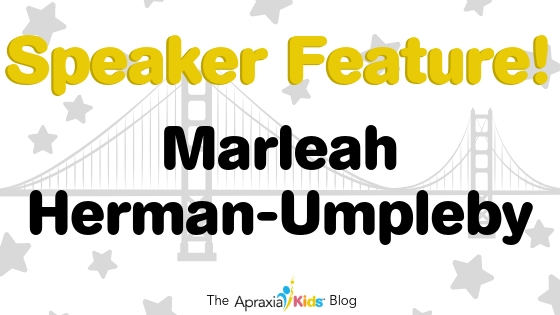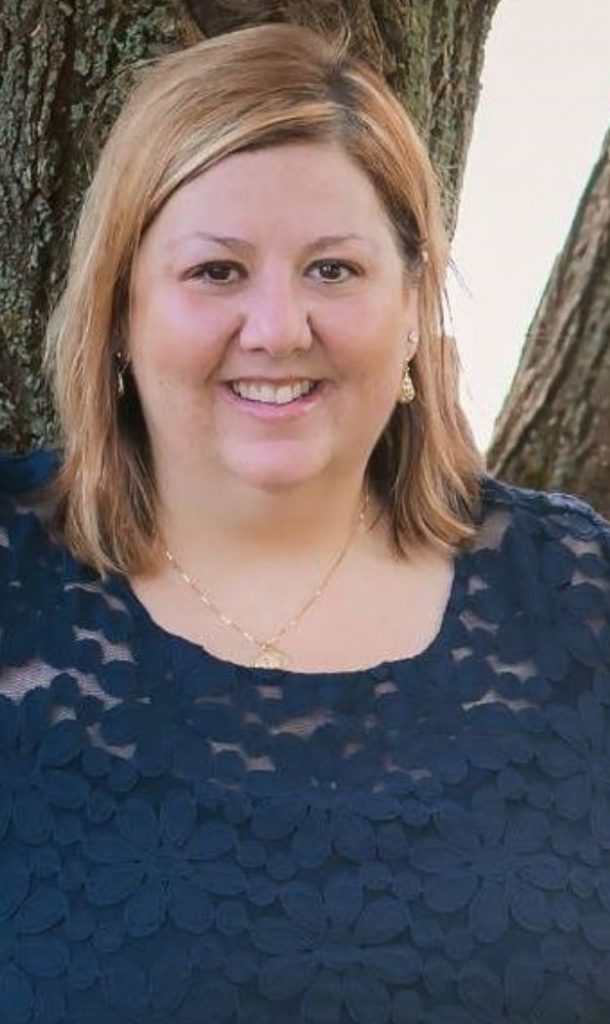
24 Apr SPEAKER FEATURE: Marleah Herman-Umpleby, M.S, CCC-SLP
With the 2019 Apraxia Kids National Conference just around the corner, we are excited to feature some of our outstanding speakers for this year!
 Marleah Herman-Umpleby, M.S, CCC-SLP has been a clinical content specialist with Tobii Dynavox for 11 years, most currently as Manager of Clinical Outcomes, with focus to cultivate connections with customers and users and bring their experiences and voices to the product development process. Her background with individuals with complex communication needs led to interest in collaborating with teams on effective interventions and supporting positive outcomes in AAC. She obtained her M.S. degree from The Pennsylvania State University, University Park, PA.
Marleah Herman-Umpleby, M.S, CCC-SLP has been a clinical content specialist with Tobii Dynavox for 11 years, most currently as Manager of Clinical Outcomes, with focus to cultivate connections with customers and users and bring their experiences and voices to the product development process. Her background with individuals with complex communication needs led to interest in collaborating with teams on effective interventions and supporting positive outcomes in AAC. She obtained her M.S. degree from The Pennsylvania State University, University Park, PA.
This year, Marleah is presenting the session “What is AAC? When and Why do We Use It?” alongside Melissa Taberski.
Course Abstract: Use of Augmentative and Alternative Communication (AAC) as a part of a comprehensive apraxia intervention that addresses both compensatory strategies and skill development is often a new experience for both parents and SLPs. Questions of when and why to use it, as well as how best to implement it in the home, school, and community setting, are often at the forefront of AAC consideration. It can be overwhelming to determine which option is the best choice, as well as how to get all members of a team on the same page in facilitating optimal usage. This session will address high tech and light tech AAC. Videos and hands-on experience will be provided to enhance the learning. A detailed case study will be highlighted to help answer questions that may arise when determining how AAC can play a role in successful therapy. Whether you are a parent or a professional, you will walk away with a better understanding of AAC usage.
Apraxia Kids asked Marleah a few questions about her upcoming session:
Apraxia Kids: Why are you excited to present at this year’s Apraxia Kids National Conference?
Marleah: This is the most interactive and supportive conference- I had a blast last year and learned a lot and can’t wait to have a chance to contribute to the learning and connections made this year in Pittsburgh!
Apraxia Kids: What can conference attendees expect from your presentation?
Marleah: An easy to follow and understand explanation of AAC with strategies you can use immediately to make a huge difference in the lives of the kids you work with and love!
Apraxia Kids: What are you most excited to share in your session?
Marleah: That AAC isn’t a decision to “give up” on working on verbal speech. It’s a tool in the toolbox to support language growth and literacy!
Apraxia Kids: If you have attended the conference before, what is your favorite part of attending? If you have not attended the conference before, what are you most looking forward to?
Marleah: The most incredible community of people who care about kids with apraxia!
Interested in learning more about all of our National Conference presentations? Click here to view the full schedule!
With the 2019 Apraxia Kids National Conference just around the corner, we are excited to feature some of our outstanding speakers for this year!
 Marleah Herman-Umpleby, M.S, CCC-SLP has been a clinical content specialist with Tobii Dynavox for 11 years, most currently as Manager of Clinical Outcomes, with focus to cultivate connections with customers and users and bring their experiences and voices to the product development process. Her background with individuals with complex communication needs led to interest in collaborating with teams on effective interventions and supporting positive outcomes in AAC. She obtained her M.S. degree from The Pennsylvania State University, University Park, PA.
Marleah Herman-Umpleby, M.S, CCC-SLP has been a clinical content specialist with Tobii Dynavox for 11 years, most currently as Manager of Clinical Outcomes, with focus to cultivate connections with customers and users and bring their experiences and voices to the product development process. Her background with individuals with complex communication needs led to interest in collaborating with teams on effective interventions and supporting positive outcomes in AAC. She obtained her M.S. degree from The Pennsylvania State University, University Park, PA.
This year, Marleah is presenting the session “What is AAC? When and Why do We Use It?” alongside Melissa Taberski.
Course Abstract: Use of Augmentative and Alternative Communication (AAC) as a part of a comprehensive apraxia intervention that addresses both compensatory strategies and skill development is often a new experience for both parents and SLPs. Questions of when and why to use it, as well as how best to implement it in the home, school, and community setting, are often at the forefront of AAC consideration. It can be overwhelming to determine which option is the best choice, as well as how to get all members of a team on the same page in facilitating optimal usage. This session will address high tech and light tech AAC. Videos and hands-on experience will be provided to enhance the learning. A detailed case study will be highlighted to help answer questions that may arise when determining how AAC can play a role in successful therapy. Whether you are a parent or a professional, you will walk away with a better understanding of AAC usage.
Apraxia Kids asked Marleah a few questions about her upcoming session:
Apraxia Kids: Why are you excited to present at this year’s Apraxia Kids National Conference?
Marleah: This is the most interactive and supportive conference- I had a blast last year and learned a lot and can’t wait to have a chance to contribute to the learning and connections made this year in Pittsburgh!
Apraxia Kids: What can conference attendees expect from your presentation?
Marleah: An easy to follow and understand explanation of AAC with strategies you can use immediately to make a huge difference in the lives of the kids you work with and love!
Apraxia Kids: What are you most excited to share in your session?
Marleah: That AAC isn’t a decision to “give up” on working on verbal speech. It’s a tool in the toolbox to support language growth and literacy!
Apraxia Kids: If you have attended the conference before, what is your favorite part of attending? If you have not attended the conference before, what are you most looking forward to?
Marleah: The most incredible community of people who care about kids with apraxia!
Interested in learning more about all of our National Conference presentations? Click here to view the full schedule!
Credentials:
Hours of Operation:
Treatment locations:
Address:
,
Phone:
Email:
Overall Treatment Approach:
Percent of CAS cases:
Parent Involvement:
Community Involvement:
Professional consultation/collaboration:
Min Age Treated:
Max Age Treated:
Insurance Accepted:




